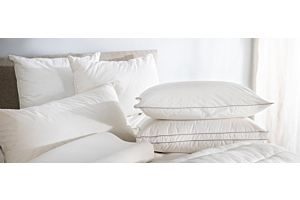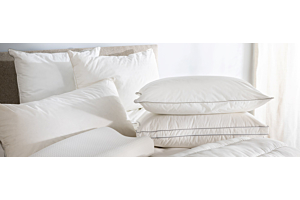Eight tips for sleeping during Ramadan

Nutrition, exercise and sleep are all essential elements of maintaining a healthy lifestyle. But what if you have to fast for 30 days, as Muslims around the world will be doing for Ramadan from the 12 April? How does fasting impact your sleep, ability to exercise and overall health? And is there anything you can do to maintain healthy sleep habits during this time?
We spoke to Saniea Zahra, customer sleep advisor at Soak&Sleep, who will be observing Ramadan, to give us her top tips.
How do you find Ramadan whilst you're working?
Ramadan is linked to the cycle of the moon so the time it falls can vary year to year, meaning that the fasting hours can also be different - you have to fast from sunrise to sunset. Over recent years, the fasting hours have been quite long so actually, I find being at work is a great distraction and it keeps me busy for the bulk of it.
I’ve realised that it’s really important that when I do eat, I eat the right things as I don’t want to get too thirsty or hungry throughout the day. I find that certain foods can affect my work performance. For me, yoghurt, dates, eggs, high protein and fibre cereals help me keep my energy levels up throughout the day.
Fasting is not just about food and detoxing your body, it’s also about improving and detoxing your mind and inner self. The aim is to get rid of negativity and make you a better person in your everyday life. Working in customer service can be challenging sometimes, but Ramadan helps me refocus on important traits like patience and understanding.

Does Ramadan affect your sleep?
Yes it does have an impact on your sleep. You have to adjust to waking up early and going to sleep early and you use the night hours to refuel. Overall you definitely get less sleep than normal. It’s important to get into a routine fairly quickly so your body adjusts to a new rhythm. Once you’ve got used to it, it becomes a lot easier.
I’m normally quite an active person but I find it harder to do much during Ramadan because I have less energy. That can make it easier to drop off for a nap, but can affect my sleep overnight because I’ve been less active. I do find I nap quite a bit during Ramadan - as the day wears on, your energy levels dip quite significantly because of the fast, so you can feel quite sleepy - a quick nap in the afternoon helps to refresh you.
What tips can you give to people going through Ramadan to help them sleep better?
1. Shower before bed
It helps having a refreshing shower before bed so you can relax and fall asleep quicker. A shower helps you to unwind and also your core body temperature can drop after you step out of the warm water - this helps you feel drowsy.
2. Keep warm and comfy
Making sure that you are comfy and cosy is important as you tend to feel the cold more during Ramadan - this may because your body is feeling weak as a result of the fasting. Adding additional wool blankets to your bed or opting for a heavier weight duvet such as this 13.5 Tog Hungarian Goose Down duvet is a good idea.

3. Set a bedtime
Ramadan also teaches us about time management so setting and planning a specific time to sleep is super important so your body becomes prone to sleeping at a certain time and more quickly.
4. Get outside
Trying to get outside during the day for a short walk helps - it gives your mind time to relax and think about the important messages of Ramadan, but also the fresh air and light exercise will make it more likely you will sleep better that night.
5. Try naps
Taking a power nap in the afternoon can help you make it through the day if you are feeling tired from the fasting - only allow yourself to sleep for 20 minutes though to ensure that you don’t impact your sleep that night. Set an alarm to make sure you’re not in bed for too long.
6. Eat healthy
Make sure you eat the right things - avoid sugary or fatty foods, and anything with caffeine. Light, healthy meals are better so your body doesn’t have to work overtime trying to digest them.
7. Block out the light
During Ramadan you rest during the darkness hours, so your sleep won’t be affected by sunlight. But make sure any ambient light from streetlights or household lights is blocked out by curtains, blackout blinds, or an eye mask.
8. Avoid electronics
As normal, avoid using your phone or laptop just before bed as the blue light can interrupt sleep.
Thank you to Saniea for her helpful sleep tips, do you have any other ways to switch off during Ramadan? Drop your advice in the comments - we'd love to hear them!







